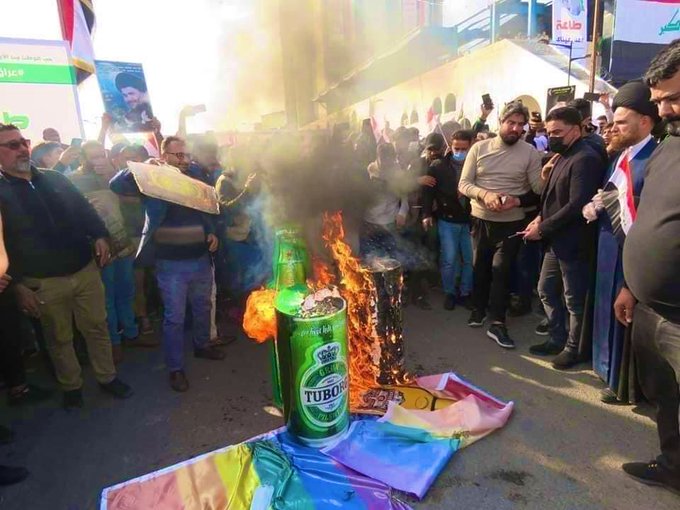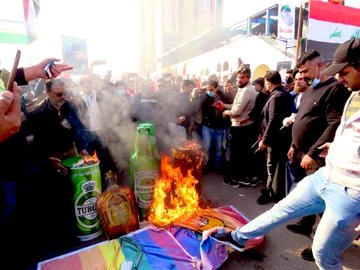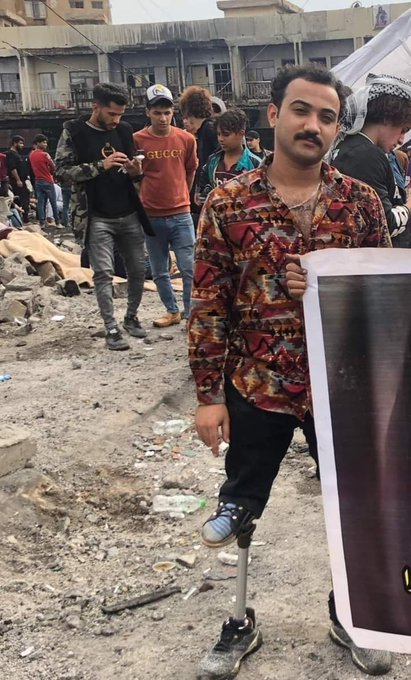Wednesday, December 2, 2020. The push for Toxic Neera continues.
Joe Biden got harasser Clarence Thomas on the Supreme Court. Now he's working to put toxic workplace 'manager' Neera Tanden in charge of the OMB.
To be fair to Neera, there are people who defend her. For example, 'journalist' Victoria Bosworth Tweeted:
Biden OMB pick
supports a Federal Jobs Guarantee, opposes punitive right-to-work, welfare-work & Medicaid-work laws. She supports $15 min wage. Claiming she's anti-progessive is tediously knee-jerk. Also, putting WOC in white male jobs IS progressive. Be less racist.
That makes no sense -- non-progressive people do not make a world progressive merely due to their skin color. Be less stupid, Victoria.
But Neera's got the pedophile vote sewn up. That is what Victoria Bosworth is. Asking a trans person to show you their genitals? That's appalling, that's treating a person as though they are a thing. More to the point, the trans person in question was underage. That makes Victoria a pedophile. So remember that, the pedophiles are on board with Neera. Thanks for sharing, Vicky, now don't ask any children to show their genitals today, okay?
In October 1991, Clarence Thomas got on the Supreme Court. According to Pedophile Victoria Bosworth's 'logic' that was a great progressive moment in history -- he was put "in white male jobs [that] IS progressive." He has done damage ever since. You can thank Joe Biden.
You can thank Joe Biden for the assault on Anita Hill after she came forward about enduring Clarence Thomas' harassment. April 25, 2019, Sheryl Gay Stolberg and Carl Hulse (NEW YORK TIMES) reported:
Joe Biden knew Anita Hill was going to be an issue for him. So a few weeks ago, as he prepared for his presidential announcement, he reached out to her through an intermediary and arranged a telephone call, hoping to assuage her.
It did not go how he had hoped.
On Thursday, the first day of his presidential campaign, the Biden camp disclosed the call, saying the former vice president had shared with Ms. Hill “his regret for what she endured” 28 years ago, when, as the chairman of the Senate Judiciary Committee, he presided over the confirmation hearings in which she accused Clarence Thomas, President George Bush’s nominee to the Supreme Court, of sexual harassment.
But Ms. Hill says the call from Mr. Biden left her feeling deeply unsatisfied.
In a lengthy telephone interview on Wednesday, she declined to characterize Mr. Biden’s words to her as an apology and said she was not convinced that he has taken full responsibility for his conduct at the hearings — or for the harm he caused other victims of sexual harassment and gender violence.
[Read excerpts from Anita Hill’s interview with The Times.]
She said she views Mr. Biden as having “set the stage” for last year’s confirmation of Justice Brett M. Kavanaugh, who, like Justice Thomas, was elevated to the court despite accusations against him that he had acted inappropriately toward women. And, she added, she was troubled by the recent accounts of women who say Mr. Biden touched them in ways that made them feel uncomfortable.
Confirmation hearings have never shown Joe in a good light. I was at one where yet another Republican got put on the Court and Joe's refusal to fight and his personal betrayal of a woman left the woman crying in the hall. That's Joe Biden. Betray a little, betray a lot, that's Joe Biden.
And demonstrating that he still will not oppose toxic work environments, Joe is nominating Neera who oversaw the toxic work environment at CAP where women were harassed constantly and Neera -- in charge of the whole thing -- looked the other way until BUZZFEED reported on it. Then Neera took action: She outed the woman who had spoken to BUZZFEED -- that shows you who Neera sides with in a toxic work environment: The harassers.
Neera is not fit to be in charge of anything. Her history is appalling. The most basic thing a manager has to be able to do is to ensure a safe work environment. Neera failed to do that. And yet Joe wants to put her in charge of the OMB.
It goes to the fact that Joe is not a defender of women.
Joe pretended for a long, long time to be a good guy, a defender of women. But the reality is, it's 2020 and he's trying to put Neera in charge of an agency which demonstrates he's still supporting the attacker and not the attacked.
Professor Zenkus doesn't seem to get it himself. Yes, outing a victim of harassment to the entire workforce is appalling and needs to be called out. But you're not holding her accountable for the toxic environment that led to women being harassed. Women complained and they were not treated seriously. You do not put the person over a work environment like that in charge of any agency.
The whole reason the attacked was outed was because she took her story to the media. Stop acting as though the only thing Neera did was out the woman. Neera was responsible for the work environment. Credible charges of harassment were repeatedly made and women were not listened to. That was Neera's choice -- a lot like Doormat Hillary Clinton.
Remember, Hillary had multiple relationships -- work relationships -- with men who were toxic. Jessica Estepa (USA TODAY):
Hillary Clinton reportedly asked to keep an adviser to her 2008 presidential campaign onboard, despite accusations that he had sexually harassed a young woman.
The New York Times reported that Burns Strider, Clinton's faith adviser at the time, was accused of harassing a 30-year-old woman who sharing an office with him. The woman told the campaign that Strider sent her suggestive emails, rubbed her shoulders inappropriately and kissed her on the forehead.
A sexual harassment report was made to campaign manager Patti Solis Doyle. Doyle reportedly approached Clinton and asked that Strider be fired. Clinton declined to do so, and Strider remained on staff.
Clinton’s history when it comes to sexual misconduct allegations against her husband — and others in her circle — is a complicated one. She’s never had a satisfying response to questions about the accusations against her husband, which include Juanita Broaddrick’s accusation that he raped her in 1978. On the other hand, she allowed an adviser to keep his job with her 2008 campaign despite allegations of sexual harassment — and when she addressed that decision this year, her comments left a lot to be desired.
That's Neera's mentor. Hillary mentors a lot of weak women -- weak women who march about in public life but are at home alone and crying because they married a bastard who cheats on them and publicly humiliates them. It's the bonding thread of so many of Hillary's relationships with women -- the sick join with the sick to avoid healing. Neera's a joke. She's basically an emotional punching bag at home and that's probably why she's so damn nasty to so many when she's acting out in public.
("And you?" I'm just a bitch. I never claimed otherwise.)
Neera's confirmation hearing in the Senate? If it takes place, women who worked at CAP and were harassed should be invited to tell their stories to the American people so we can decide if that's the sort of management we believe should exist in the federal government.
Tara Reade has made a credible accusation of assault. I believe her. I believe Joe Biden assaulted her. She recently wrote:
The hypocrisy of the Democrats and the Me Too movement is not anything new. It was done to Rose, Juanita Broaddrick and others. The Democratic party is not only complicit with rape, it empowers the predators all the while hiding behind rhetoric that women are protected. I am a woman, I was a Democrat, and I was not protected. One of the unfortunate consequences of the fall-out for this U.S. Presidential election is the chilling effect my experience is having on other survivors. My coming forward and the resulting attacks on me illustrated the very dire consequences of anyone coming forward about a powerful person, most especially a Democrat. However, I do not regret coming forward about my history with Joe Biden, nor speaking up against xenophobia and the absurd anti-Russia narratives being weaponized to brainwash American citizens.
Time and again, we fail. We fail over and over and we fail for a number of reasons. Tara Reade was a test and too many feminists shoved her aside because Joe was their personal savior. Bill Cosby? Guilty of multiple attacks on women. News in the '00s and this decade. But, help me out, I seem to remember a woman calling him out in the 1990s.
What was her name?
Tammy Bruce. She was part of NOW -- forced out for calling out OJ Simpson. It's so interesting how the women who best exemplify what feminism is supposed to mean are the ones the movement lets down or flat out betrays.
I think we've betrayed Tara. Yes, some of us have spoken out for her. But when we let liars publish op-eds in NYT saying 'I believe her but I'm voting for Joe and I'm a feminist,' no, bitch, you're not a feminist. Rape and assault? We don't dismiss those. That's what Men's Rights activists do. That's what the US legal system did for far too long. We betrayed Tara. We let these liars pose as feminist. They're not feminists.
Don't talk to me about abortion if you can't defend a woman from assault. Don't talk to me about any rights you supposedly believe in. Because if you're okay with a woman being raped, you're not a feminist and you're not anyone that should be allowed to pose as a feminist.
Tammy Bruce is a right-wing figure now. I have no idea what she speaks of or what issues she supports. I do know that instead of ostracizing her and punishing her, we could have tried to have a lively debate, a give-and-take, and kept someone who is passionate about women's issues (or was then -- again, I have no idea about today). But she was shoved aside. Phyllis Chesler remains a feminist but she was betrayed by the movement. She was raped and instead of getting support, Robin Morgan and Gloria Steinem undermined Phyllis to protect their friend (her rapist).
These are stories and issues that The Fourth Wave will need to grapple with and address. I hope they do so honestly. Gloria never did. She emerges, pushing Betty Friedan aside, and she immediately damages the movement. When Betty was around (1972), women made demands at the Democratic Party convention. 1976? Gloria's there telling women we're asking too much and we must not rock the boat. We go form staging sit-ins at magazines to doing nothing but our near annual abortion march. We don't fight for rights, we beg for the rights we do have to be upheld.
And time and again, she pushed this or that woman aside. The Red Stockings is just one example. There's her hissy fit when 60 MINUTES was recording a meeting and Camile Paglia's name came up and Gloria shut the whole taping down immediately.
She's a coward and that's no surprise when you look at her history. She didn't lead, she misled and she set the cause back. She also failed to step aside which must have Betty Friedan laughing somewhere since she used Betty's age (Betty was in her fifties) to push Betty out of leadership
There's a lot there for The Fourth Wave to unpack. And it will be messy and it should be. It should be lively and rewarding as well.
Let's hope they're up to the task.
Let's hope that they aren't ridiculous like John Grant at COUNTERPUNCH. Is he tonguing Joe Biden's shaft or just the nuts? Don't pretend you're against the Iraq War and write that ridiculous column. Joe is a War Criminal. And I'm so damn tired of the 'professional' peace movement and their stupidity. Joe's overturning the 2010 elections in Iraq need to be called out and, all these years later, I've lost sympathy for the cowards who can't do it.
You want to end wars, you have to disrupt. You're not going to end anything with butterfly kisses to Joe Biden. Let's hope The Fourth Wave has the spine that people like John Grant lack.
Dropping back to Monday's snapshot:
Friday saw an attack on the peaceful protesters in Nassariya. This was an attack, it was not a ''clash.'' The protesters had been in al Haboubi Square for some time. When Prime Minister Mustafa al-Kadhimi ordered the Baghdad square attacked and the tents torn down a month ago, he attempted something similar in Nassaiya. It did not fly in the city, it did not fly in the province (Dhi Qar Governorate). Mustafa had to back down and the protesters continued their peaceful protest. As Sinan Mahmoud (THE NATIONAL) observed yesterday, "The coronavirus and violence against demonstrators has seen the moement slow elsewhere but it endures in Nasiriyah."
Friday, they were attacked. The death toll has now risen to 16. With over 80 more left injured that number could continue to increase.
Shi'ite cleric Moqtada al-Sadr ordered the attack. Dilan S. Hussein (RUDAW) reports that Moqtada told his cult to "clean up the 'atheism' that he said had taken over the city's streets" before sending them out on Friday. They arrived at the square with loaded guns, in four-wheel vehicles and with props.
Basra journalist Mohammed Qasim Tweets:
Moqtada gave the orders and then sicked his rabid cult on the protesters.
This was a planned assault. Not only does the Iraqi government need to disarm his goons, they need to put them on trial. Equally true, it was not necessary for the cult to enter the town square (al Haboubi square) -- where the peaceful protesters were -- and have been for over a year -- in order to get to any destination. They chose to enter that square, they did so with props and they did so with guns. And they chose to enter the square in "four wheel drive vehicles." This was not a 'clash,' it was a planned assault.
By Tuesday, Nasiriya protesters were back at the site, albeit surrounded by federal police and at the mercy of a curfew. But unlike Baghdad’s Tahrir Square, where in October tents were cleared out and roads reopened, Haboubi Square is still alive with demonstrators.
“The people of Nasiriya have always been praised for their revolutionary belief,” said Sheikh Imad Rikaby of the Rikaby tribe. Like him, Iraq commentators have frequently alluded to Nasiriya’s long history of rebellion and revolutionary politics to explain Dhi Qar’s central role in the protests.
“I think the real explanation is likely more mundane and reflects primarily the comparative neglect of the province by the federal government when compared with Basra,” said Ben Robin-D’Cruz, a researcher on Iraqi politics at the University of Edinburgh.
We'll include this Tweet:
Iraq has one of the world’s youngest populations. Many of them are out of work and look to family and friends for financial support.
Instead of taking tough decisions to strengthen institutions like the judiciary, which can enforce private contracts, politicians have used Baghdad’s oil wealth to reward supporters with jobs.
This has bloated the public sector; a large chunk of the government's budget of $80 billion is spent on salaries and pensions. This burden is set to increase as the country's population of 38 million increases by almost a million people every year.
This year, the cost of salaries for 4.5 million public sector workers and 2.5 million pensioners, will eat up all of Iraq’s oil revenue, according to the Iraqi finance ministry.
In October, the Finance Minister Ali Allawi released a white paper promising to cut government deficit and plug the holes from where corrupt officials siphon off state revenue.
Corruption has become endemic in Iraq. Only a tenth of the $8 billion in customs revenue reach the official coffers - the rest is pilfered along the way. That’s why even a minor job of a clerk in the customs department is being sold for as much as $100,000, Ali Allawi recently said.
While the oil revenue was spent on pacifying constituents, little has been spent on developing infrastructure to facilitate the private sector, which plays a miniscule role in the Iraqi economy.
“What’s mainly holding Iraq back is corruption and mismanagement,” says Mawlawi.
We'll wind down with this alert from Human Rights Watch:
The ongoing closures of Iraq’s displaced persons camps on short notice is forcing some residents into homelessness and poverty, Human Rights Watch said today.
Human Rights Watch has repeatedly said that the authorities should
allow freedom of movement for residents of camps, which in some cases
have functioned like open-air prisons. The government’s renewed action
to facilitate documentation for families is a positive step toward this
goal. But the authorities should not force camp residents out without
first ensuring they have alternative access to shelter, food, water,
health care, and other basic services in a safe and secure environment.
“Reintegrating families who have spent years in camps back into Iraqi
society so they can start to lead a normal life is a positive step.”
said Belkis Wille,
senior crisis and conflict researcher at Human Rights Watch. “But the
current approach of forcing people out of camps that have provided them
with food, shelter, and security for years, often with only 24 hours’
notice, makes them even more vulnerable.”
In October 2020, Iraqi Prime Minister Mustafa Al-Kadhimi formed a committee with the mandate to close about 17 camps,
currently housing at least 60,337 people. The camps house people
displaced by fighting between the Islamic State (also known as ISIS) and
Iraqi forces between 2014 and 2017. Since mid-October, authorities have
closed 11 camps and rendered another two into informal settlements,
forcing out at least 27,191 residents, mostly women and children,
according to aid workers. At the time of publication, in
Baghdad-controlled areas only five remained open and more camp closures
were ongoing.
The committee has said that it aims to close all camps in
Baghdad-controlled territories by December 2020, and those in the
Kurdistan Region of Iraq by 2021, three aid workers told Human Rights
Watch. Many of the families have stayed because they have been unable to
obtain civil documentation and because they fear retaliation if they
return home because they may have family links to ISIS. Others are
unable to afford rent, basic services, or to rebuild their destroyed
homes, or their home areas lack basic services including health care and
education.
Human Rights Watch reporting has documented
that the Iraqi authorities have generally made decisions on where these
families can live without adequate consultation, deciding either to
leave them in the area which they fled, move them to another camp, or
force them to return to their home areas. Up until now, the government
has not undertaken a thoughtful analysis of each family’s specific
situation and vulnerabilities before forcing them out of camps. Aid
workers said the government is trying to develop a returns plan with
these elements in mind but does not have this in place yet. The
government’s newest push to close all remaining camps is so rapid that
it is forcing people out with no time for them to figure out where it
would be safe for them to go or how to get housing.
From November 11 to 17, 2020, Human Rights Watch interviewed five
residents of Hammam al-Alil (HAA) camp in Nineveh and three residents of
Habbaniya Tourist City (HTC) camp, all of whom requested anonymity. The
authorities closed HAA on November 14, forcing out at least 8,585
residents. HTC was closed on November 11, though the authorities allowed
the site to remain open on an informal basis because over 200 families
in the camp had nowhere safe to go. Before forcing camp residents out,
security forces in HAA conducted a “security screening” of the
residents, and as part of the process helped facilitate access to civil
documentation for families missing identity documents.
Security forces had previously denied
security clearances required to obtain identity documents and other
essential civil documentation to thousands of Iraqi families perceived
to have ISIS affiliation, usually because of their family name, tribal
affiliation, or area of origin. This denied them freedom of movement, their rights to education
and work, and access to social benefits and birth and death
certificates needed to inherit property or remarry. The authorities have
prevented thousands of children without civil documentation from enrolling
in government schools, including schools inside camps for displaced
people. The efforts to issue documents alongside these closures is a
positive development.
However, aid workers at HTC and HAA told Human Rights Watch that the
authorities there had forced some families to engage in a process known
as tabriya in order to get their security clearance before leaving the camp. The process of tabriya requires them to open a criminal complaint disavowing any
relative suspected of having joined ISIS. After they file the
complaint, the court issues them a document to present to security
forces enabling them to obtain their security clearances.
After completing the screenings and issuing documents, security forces
only gave camp residents Human Rights Watch interviewed between one and
seven days to choose whether they would return home or settle elsewhere
in the country, with most given only 24 hours. None of them got free
government transportation if they were not returning to their homes, nor
any financial support, although the government had promised to give all
returnees a compensation package of US$1,500. It is unclear whether
families who did not return to their homes but resettled elsewhere will
ever receive the package.
All of the families interviewed said they would not return home because
of concerns for their personal safety. Some were able to move elsewhere,
though they were struggling to afford the rent. A man from Anbar who
was forced out of HTC said that security forces gave him the option to
move to another camp in the area that has not yet been closed, but he
refused and instead chose to rent a home in another city.
“Since 2017, the authorities have relocated me three times,” he said. “I
don’t know why they keep moving people from one camp to another. If the
government is not going to give us some compensation so we can rebuild
our homes and afford basic services and guarantee our safety, then why
are they closing the camps?”
According to aid workers tracking the camp expulsions, many of the
families forced out of HAA have since reported that they were struggling
to afford basic services in the areas where they had ended up. Aid
workers who have followed camp departures from August to October said
that 50 percent of displaced people had less access to food upon leaving
and 60 percent said they had less access to water. Twenty-five percent
said they were not able to get health care. These figures are of
particular concern as the weather gets colder and the Covid-19 pandemic
rages on in Iraq. Aid workers also said some families were suffering
from “daily harassment” and blackmail at the hands of their local
communities since returning.
Four of the residents interviewed said they had wanted to return home
but that local residents had blocked their return, forcing them into
further displacement and leaving some even more vulnerable.
Iraq is obligated under international law to protect, respect, and
fulfill the right to an adequate standard of living, which includes
ensuring that everyone has adequate food, water, sanitation, and
housing. Article 30 of Iraq’s constitution
states that, “The State shall guarantee to the individual and the
family – especially children and women – social and health security, the
basic requirements for living a free and decent life, and shall secure
for them suitable income and appropriate housing.”
The authorities should ensure that every person in Iraq has access to
their civil documentation, and should halt all efforts to push residents
out of camps until they renew the residents’ identity documents. Before
closing any camp, the authorities should ensure that families in the
camps have a minimum of 30 days and are given enough information to
decide where they want to resettle, as well as accessible transportation
to their preferred location.
The authorities should ensure that they provide families with damaged
homes with the financial resources to rent a property as well as
financial assistance to help them rebuild their homes. The authorities
should also ensure that families who cannot afford to pay for food,
electricity, water, and other basic services have access to all of these
without charge.
“While the aim of this push to close camps seems to be to improve
stability across the country, stripping people of the only access they
have to shelter, food, and water and sending thousands into further
displacement will actually have the opposite effect,” Wille said.
Families Prevented from Returning Home
Three HAA camp residents told Human Rights Watch that they wanted to
return to their hometown, Qayyarah in Nineveh. But once the closures
were announced, their town’s mayor visited the camp and informed them
that he could not vouch for their safety if they returned. He warned of vigilante violence against them for their perceived links to ISIS. One woman, age 28, with three young children said:
I don’t know where to go. I can’t return to my village. My house is destroyed, and anyway, the community would not accept me back. I can’t afford rent somewhere else because I am a single mother with no income. I felt safe with my children here in the camp, with aid workers around. I am a young woman, and outside of a camp, I might be exposed to sexual harassment. They should let me to stay here rather than exposing me to further risks outside the camp.
Another woman from Qayyarah said that armed forces were occupying her home, so even if she did risk returning, she would have nowhere to live. She has five children and is taking care of three more. She said that though she had found a house in Mosul to rent, she had no stable income to afford it. “If the government could help me safely go back to Qayyarah and sell my house, then I could afford to buy a new house in Mosul,” she said.
A woman who had been living in HTC, whose husband is in jail on terrorism charges, said that she was thrilled when security forces told her on November 1 that she could return home to her village in Jazirah al-Khaldiyah, a subdistrict in Anbar:
They promised that if we decided to go home, they would guarantee our safety. On November 8, a group of seven families headed back to my village, escorted by two military vehicles. While we were at the checkpoint to enter our village, an old man came and said that he knew us all personally and that we were not allowed to return home. The military tried to negotiate with him but it didn’t work, and so they forced me to move to another camp in the area, saying I was not allowed to go back to HTC because it was being closed. I want to be stable in one place so I can register my children in school and have a normal life like everyone else.
According to the aid workers, at least 121 families from HAA camp and
503 families from HTC have been unable to return to their homes and
have been forced to move to nearby camps that remain open for now. Aid
workers who have followed camp departures said that 33 percent of the
displaced people were ultimately not able to return to their home areas,
with over 60 percent of women they spoke to saying they could not
return home because of concerns for their personal security.
A man with seven children from Shura district in Nineveh said that
security forces gave him 24 hours’ notice to leave HAA. “They gave us
the option to go wherever we wanted, but they didn’t give us time to
prepare or even plan where to go,” he said. “Many of us didn’t have
houses still standing to go back to, and some of us would face security
risks if we went home to areas where there are tribal tensions.” He said
he was currently renting a home in a town where he thought he might be
safe, but that he had limited means to keep up on his rent payments.
The following sites updated:






